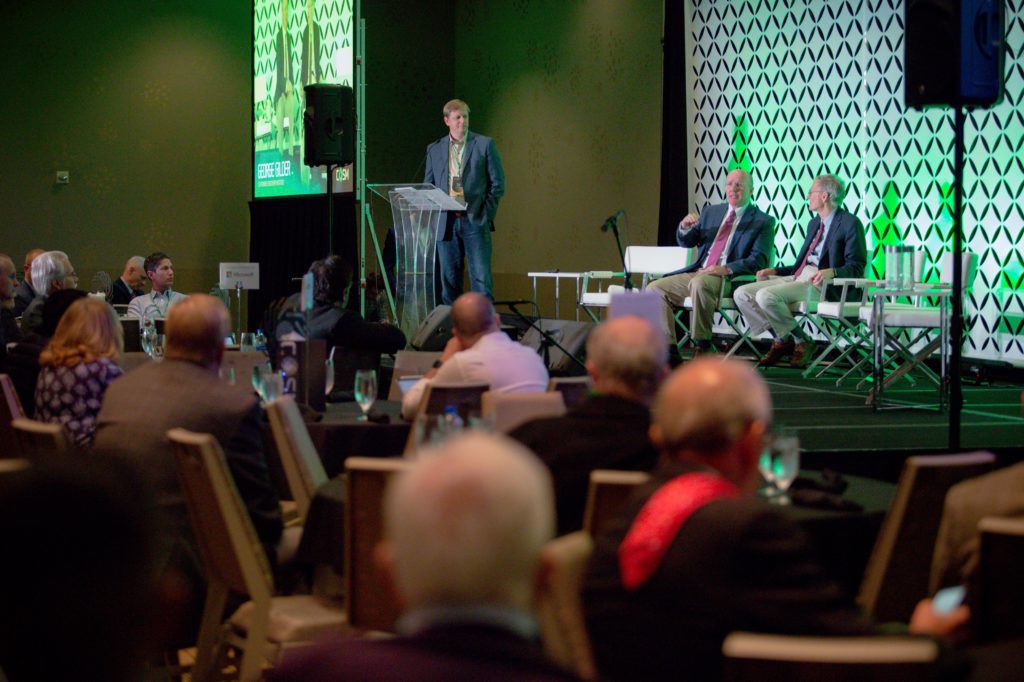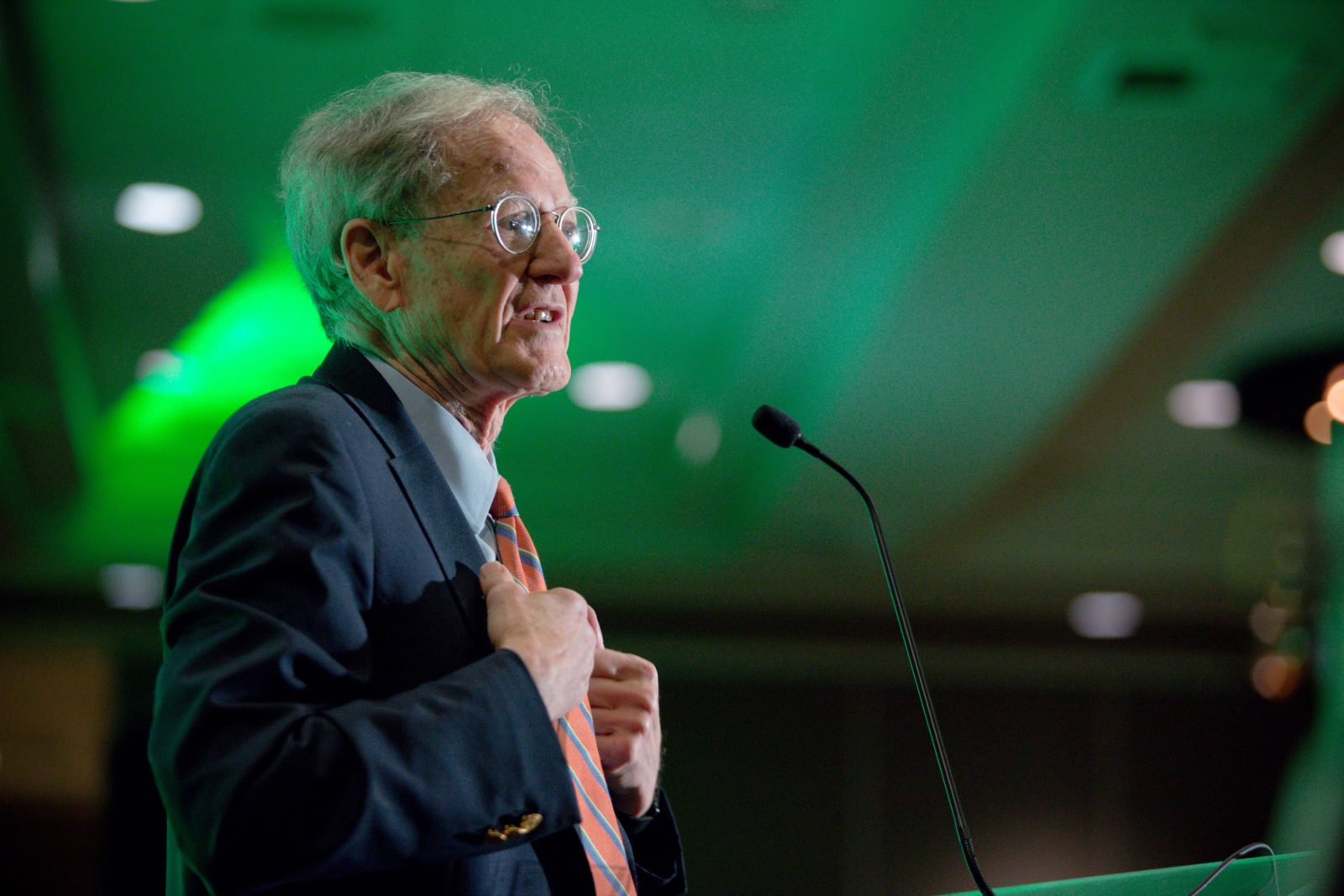Democracy & Technology Blog Reporting Back from the COSM Conference
Crossposted at COSMHumans don’t decide what to build by making choices from some cosmic catalog of options given in advance. Instead, by inventing new technologies we rewrite the plan of the world.
Peter Thiel, Zero to One.
And we were off, for a three-day tour of the COSM, rewriting the plan of the world in time-money theory, 5G communications vision, artificial intelligence (AI), and crypto-internet architecture.
It was my COSM conference at the Westin hotel in Bellevue, across the water and an ideological gulf from downtown Seattle.

The conference began with the incandescence of Peter Thiel, declaring his belief in a fully human future that we choose and endow rather than in a machine singularity that chooses us and shunts us aside.
Followed with a definitive account of the current state of AI by the venerable former chief research officer at Microsoft,Craig Mundie. Mundie revealed that Alpha Go, the Google DeepMind program that defeated the world champion in the game of Go, had gone on in recent weeks to pioneer a new standard in protein folding. Advancing from the unaided human level of two or three correct protein configurations out of 40 to some 33 correct folding solutions out of 40, DeepMind illustrated the huge promise of the technology.
Winning world leadership on that crucial biotech frontier, AI proved once again that computers can explore any deterministic regime at gigahertz speeds. But the world and the universe and human minds are not deterministic. As Alan Turing himself explained, all such computer programs ultimately require human “oracles” to program and interpret them.
Then came William Dembski, the philosopher author of pathbreaking books on mathematics and hierarchical logic. In a striking upside surprise that has brought him sudden wealth, his new company liberates educational rating systems from the subjective U.S. Views of journalistic guesswork. Dembski’s unique algorithm drills through all the manipulative propaganda that dominates other rankings and identifies the nation’s best university as Caltech. A new board member of Discovery, Dembski expounded the deep inner logic of “money creation in a purely informational world” which he is exploring in a new book.
Following Dembski came the first of several panels exploring the role of the blockchain in resolving the dual crises of internet security and global money in an era of AI, 5G, and the internet of things. Led by the lucid and incisive Steve Forbes and former US Mint Director Ed Moy, we explored the role of gold and the primacy of time, as the intrinsic foundation of money as a measuring stick. Time is what remains scarce when everything else grows abundant, as I said, but it is not capped.
Real money as a metric must not be capped as bitcoin is but fixed in price as gold is.
On the board of several crypto-currency companies, Moy brings his unique perspective and authority in explaining the role of the blockchain as the transformative technology of a new era of entrepreneurial startups.
Another Day of Transformative Discussion
The second day began with Andre Fuetsch, President of AT&T Labs and AT&T CTO, expounding the revolutionary future of 5G. He showed that the new standard would bring to wireless technology a hundredfold reduction in latency, expanded band-width, and a million-fold rise in communications density for the internet of things.
To doubters of the need for this advance, the subsequent panel brought Jules Urbach’s description of new technologies of ubiquitous holography and virtual worlds. These tools for a new internet architecture could propel us soon into a world of 6G, which ASOCS of Israel is already pursuing as its prophetic CEO Gilad Garon announced.
Nick Tredennick, the legendary chip designer, now chief of Jonetix, cautioned that all these advances in an internet of things would entail a new chip-level security system, not the mere software that most companies are offering in their virtualization programs.
A high point for me came next in my on-stage interview with Andy Kessler, former Bell Labs engineer and Velocity Investment fund founder now multi-book author and popular Wall Street Journal columnist. He showed that far from monopolies, all the US high tech leaders, from Apple and Amazon to Google and Facebook, are already harboring the seeds of their decline.
For lunch, we got a broad and authoritative depiction of the transformative reach of blockchain from Yorke Rhodes III, the co-founder of blockchain at Microsoft and the head of Azure crypto services.
Following Rhodes, Gale Pooley, a new fellow at the Discovery Institute and paragon of time-prices, demonstrated that advances in technology had vastly improved standards of living around the globe and nullified the alleged inflation registered by official consumer price indices and deflators.

Calculated broadly by dividing GDP by hours of work, time-prices are the true prices that people pay for their goods and services — the hours and minutes they have to work to earn the money to buy their standard of living.
I commented that Pooley’s findings counteract all the fears and fantasies of negative interest rates, victimized middle-class workers, and stagnant innovation. Pooley calculates that a nominal rate of zero translates into a true time-priced rate of 3.6, a perfectly normal interest rate.
Pooley points out that time-prices reconcile the central cleavage at the conference, between Thiel’s belief in a technological slowdown and his time priced demonstration of a technological boom.
Thiel is addressing the dimension of Zero to One innovations on the frontiers of creativity — what John Schroeter and I call “Moonshots.” Time-prices measure the global advance of what Thiel calls one to “n” progress, as existing inventions are applied around the world.
This is a divergence between new vertical inventions and horizontal spread of their applications across the globe.
In future prophecies, as the FCC goes after China’s 5G telecom star Huawei as if it harbored weapons of mass destruction, I will pursue this debate and its eruption on the final day of COSM.
The climax was the sharp and authoritative contribution of Michael Kratsios, the chief technical officer of the US government.


